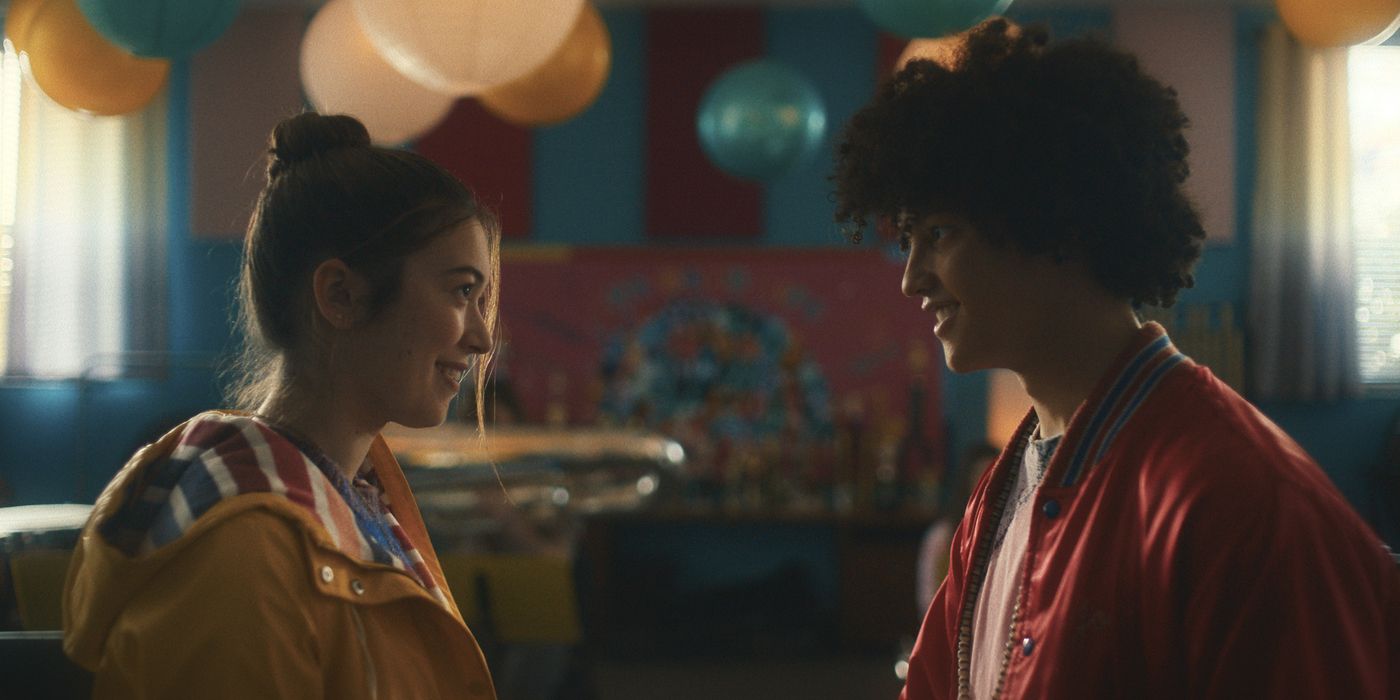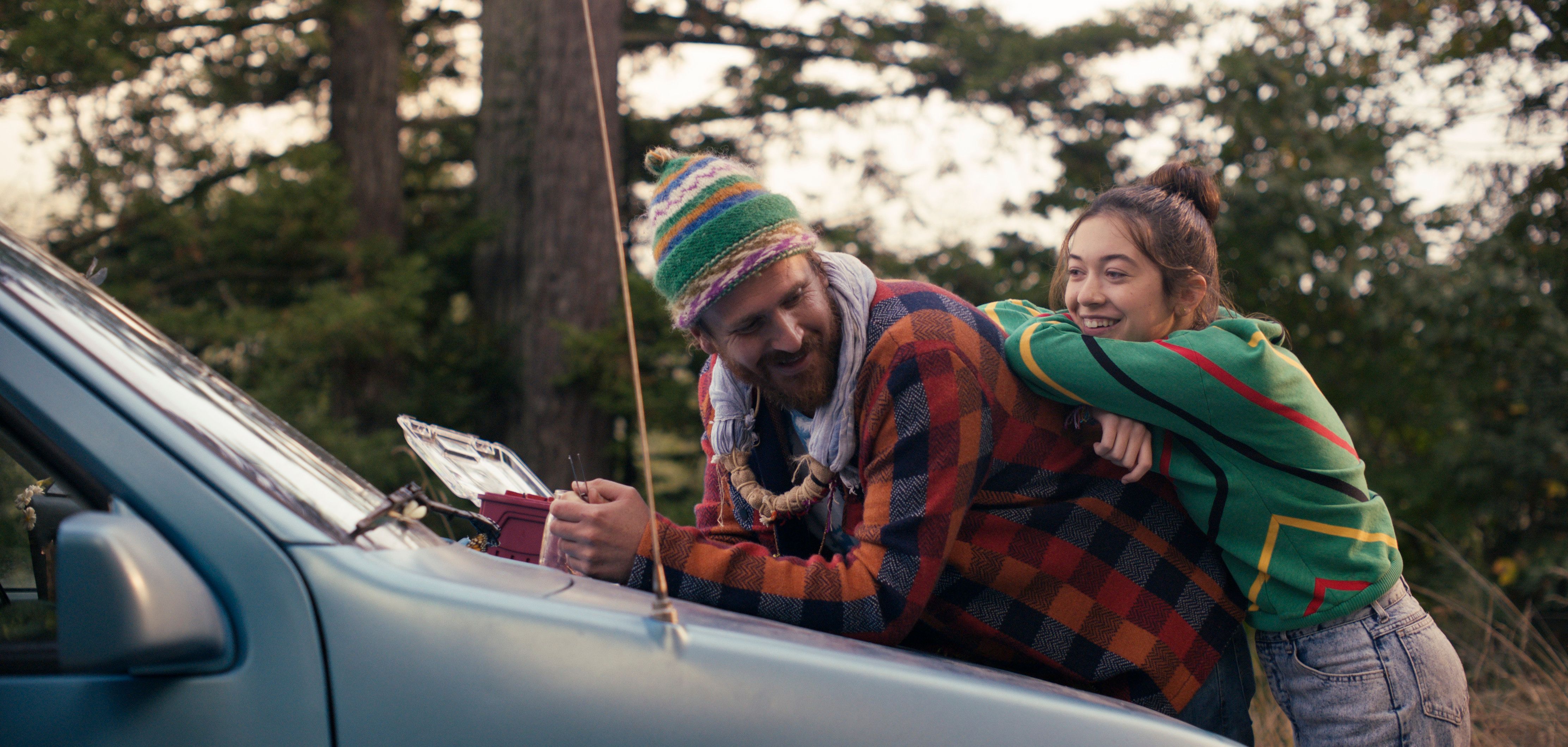“The most terrible thing you can imagine can happen anytime,” begins The Sky Is Everywhere, the YA adaptation from Madeline’s Madeline and Shirley director Josephine Decker. For lead character Blennies Walker (Grace Kaufman), the worst has already happened to her, having lost her older sister Bailey (Havana Rose Liu). Lennie writes out her emotions about her sister's shocking death on the leaves she finds, or she puts little sayings on music paper that she places in the woods. One such platitude has Lenny saying that she wishes her shadow could get up and walk beside her. Another states that Bailey always walked in front of Lennie, so she knew what path to take. Without her sister, Lennie feels like only half of a whole.
Based on Jandy Nelson’s book of the same name, with a screenplay written by Nelson, The Sky Is Everywhere centralizes on how massive grief affects the teenage Lennie. This grief can sometimes seem melodramatic, like when she states that food should taste like ash this soon after her sister’s death, but quite often, The Sky Is Everywhere is hitting on some very real, honest emotions that one doesn’t usually see in YA adaptations. But at the same time, Decker awkwardly shifts between this type of raw emotion, and an extreme quirk that stops The Sky Is Everywhere in its tracks.
Yet Decker is also presenting a vibrant take on a genre that can often be pretty rote. With an absolutely gorgeous, lush style and colors that pop in every frame, Decker and cinematographer Ava Berkofsky (Insecure) have made a teen drama that looks unlike anything that has come before it. At times, Decker almost seems to be inspired by Michel Gondry and Spike Jonze and their more eccentric choices. Trees bloom arms that are covered in flowers, memories crash in the woods like falling debris, and music literally knocks out an entire hallway of listeners. There’s a flourish that Decker and Berkofsky bring to The Sky Is Everywhere that makes this one of the most striking teen films in recent years.
But with this unconventional style also comes that idiosyncratic tone that sticks out like a sore thumb. As a story about grief, The Sky Is Everywhere almost always thrives, but when this becomes a story about high school, the film falls prey to its peculiarities. At times, the movements of characters have their own sound effects, as if to really bring attention to the film’s flamboyance, while sometimes the way characters talk lacks any realism.
The best example of this film’s duality comes in the main love triangle. Lennie is torn between two guys: Bailey’s former boyfriend Toby (Pico Alexander), and the new musical star at Lennie school, Joe Fontaine (Jacques Colimon). For Lennie, Toby represents her grief, someone that knows how she feels, and whom she can let her emotions free. In a world where no one seems to understand what she’s going through, Toby knows better than anyone. Meanwhile, Joe represents the possibilities of life, the wonderful music that she once heard that she could potentially hear again. Bailey can choose to wallow in her pain and not move forward, or she can grasp the opportunities that life has to offer.
Again, The Sky Is Everywhere blossoms when it becomes a look at deep sorrow at a young age, which Toby can certainly help cultivate. And while it's clear how Lennie would also like Joe, their interactions are so full of these little mannerisms that holds The Sky Is Everywhere back. It’s as if The Sky Is Everywhere is either the most earnest, candid look at teenage grief, or it’s an extremely unconvincing tale of young hopeful love, and rarely does the film explore the middle of these emotions.
But it’s the excellent performance by Kaufman that is always the key to when this film is at its best. Lennie could’ve easily been seen as a whiny, exhausting character, yet Kaufman makes this type of complete hopelessness and fear about the future completely relatable and grounded. We’ve all lost someone that we thought would be by our sides forever, and Kaufman knows exactly how to present this in a moving and thoughtful performance that elevates this film significantly.
Maybe the closest middle ground for these feelings comes from Jason Segel and Cherry Jones, who play Lennie’s uncle and grandmother, respectively. Both are free-spirit types who grow roses that apparently make people fall in love, and took care of Lennie and Bailey when their mother died at a young age. Jones’ Gram Walker—like Lennie—is still struggling with the death of Bailey, while taking the approach that it’s better to remember the joy Bailey gave, rather than thinking of what she’s lost. Segel’s Big Walker is more of a caricature, a four-times divorced, pothead uncle who drives a car he calls the “Truthmobile,” in which driver and passenger have to be completely honest. Both Jones and Segel are decent in roles that could’ve veered into absurd, but instead, show how growing up doesn’t necessarily mean knowing better about how the world works. Yet both characters are also emblematic of how broad The Sky Is Everywhere can frequently become.
Within The Sky Is Everywhere are two different movies fighting against each other that just can’t quite mesh together into something that completely works. And yet, The Sky Is Everywhere is so full of imagination and inventiveness, mixed with some truly beautiful moments of emotional truth that it’s impossible to ignore what this film does right, despite this mishmash of tones. It’s easy to see how The Sky Is Everywhere could be a powerful and essential story of loss and pain for a younger person at this age, similar to how The Perks of Being a Wallflower was for the generation before. The Sky Is Everywhere takes a lot of swings that miss, but the heart of the film is in the right place, and when it really works, The Sky Is Everywhere knocks these emotions and ideas out of the park.
Rating: B-
The Sky Is Everywhere is available to stream on Apple TV+



